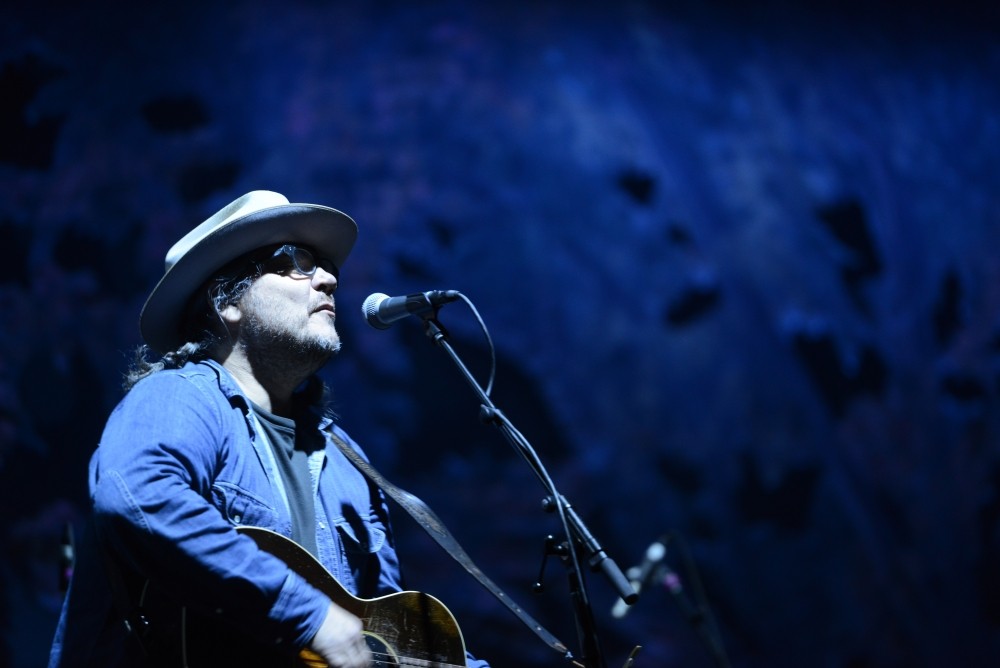On Sunday, Oct. 28, musician-composers Nels Cline and Ryland Angel premiered their project “The Call” at Ted Mann Concert Hall.
In preparation for the performance, Cline and Angel spent a week working with the University Singers, a choral ensemble made up of University of Minnesota students.
The pair sat down with A&E to talk meet-cutes, Scandinavian influences and loon calls.
How did you two first meet?
NC: Oh, I love to tell this story.
RA: [singing his version of The Human League’s “Don’t You Want Me”] You were working as a waitress in a cocktail bar.
NC: [laughing]
RA: Sorry, a little aside. It just went through my mind.
NC: My wife and I were living in a brownstone. [Angel] came around looking for our roommate, who was the man of the house. He wasn’t home, so I went out to see who was at the door.
It was a security situation with a camera in the West Village, and here was this guy on a bicycle looking for our roommate. We just started chatting. He lived about two blocks away.
RA: We became fast friends … just hanging out.
Why did you choose Ted Mann Concert Hall at the University as the location to premiere this work?
RA: I realized this was the perfect place to put on “The Call” – and it’s because, you know, obviously the Twin Cities and Minnesota are the choral capital of America. I was going through different possibilities with different choirs and it sort of made sense that it would be in a workshop setting as we were developing this piece. This was the perfect setting for it … developing it and letting our own ideas meld.
What was the inspiration behind “The Call”?
NC: It was basically [Angel]’s idea that was very general: to use the inspiration from what he had heard in Sweden, which turned out to be a singer utilizing a lot of content that stems from a tradition of communication, of singing the news from village to village.
[Angel] wanted to expand on this idea as inspiration for a broader, more contemporary suite. I thought it was a cool idea, and I had never written choral music before.
RA: It’s beautiful by the way. His music is absolutely stunning.
NC: The idea about singing and communicating from village to village led us to thinking about why someone would do that in a small village. Well, someone would do that to be civil … to report news, not just for news’ sake, but also to give warnings or impressions about impending weather changes.
This idea of community led us to the idea of cooperation. What is cooperation? What is a society? How does this figure into our contemporary world? That’s what these pieces are. Some are poetic and maybe just inspirational ideas about the things we encounter and the things we aspire to in daily life. That could be spiritual ideas, simple joy, grief, anger, prejudice and all the different foibles of the human race.
RA: The other thing that inspired me was trips to White Earth Lake in Minnesota over a period of summers. In the morning, I’d wake up and go fishing. As I would walk down to the lakeside, I’d hear … the beauty of a loon call. And the fact that it’s not just us … it’s different types of wildlife.
How did you come up with this unconventional ensemble … the combination of a countertenor, a chorus and a lot of instrumentalists?
RA: It’s choral central. I wanted to do it with a choir. And I can sing a bit. I sing tenor and countertenor. [Cline] is co-producing it with me, and he’s a guitarist. And then we love a piano. There’s nothing wrong with a string quintet either, and a flute and a bit of clarinet.
NC: When [Angel] first came up with this idea, I thought it was an orchestral piece. As time went on, I found myself unable to write the music because I was so daunted. I started reducing the instrumentation in my mind and thinking about this Scandinavian aspect of it. I’ve visited there many times and I have some Scandinavian blood.
I started re-reading [Scandinavian] poets and pondering the lifestyle and architecture of the domiciles and churches of Scandinavia. I thought, ‘Well, I really want to have some organ on this, but not church organ.’ We’re not using one in this piece, but that very thought enabled me to think of this as more of something that could be sung in church, or at home, in a tavern. Somehow this became freeing.
What has it been like to collaborate with the University Singers?
NC: It blew my mind, and it continues to blow my mind. I’m amazed that this is actually finally happening. We’re really grateful to [professor and University Singers conductor] Kathy Romey and the students here. They aren’t even just being patient, they’re being enthusiastic. I think that that’s remarkable. This is really special, what we’re doing here. I’m very thankful.
RA: Me too … very, very thankful. Without Kathy, we wouldn’t be doing this.
This interview has been edited for length and clarity.








